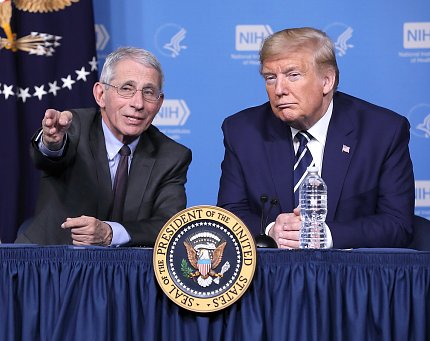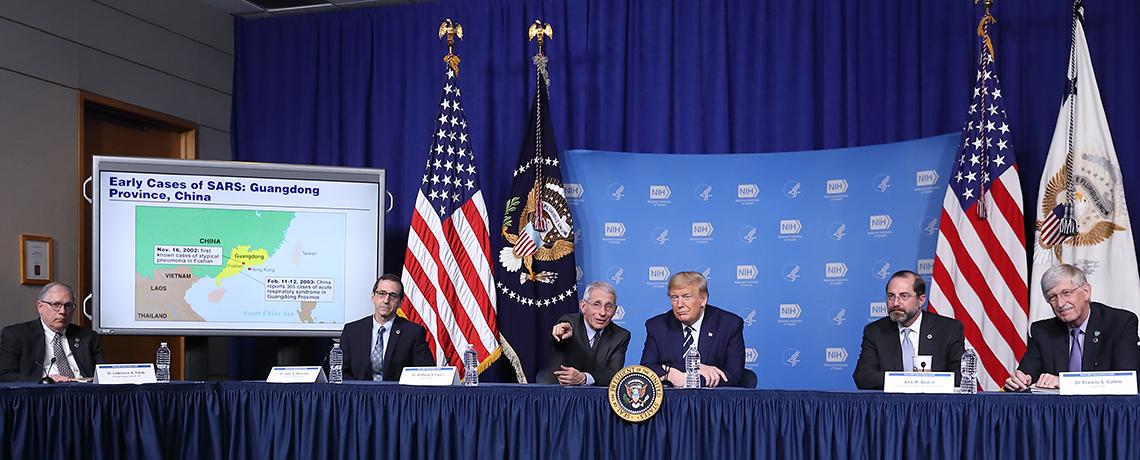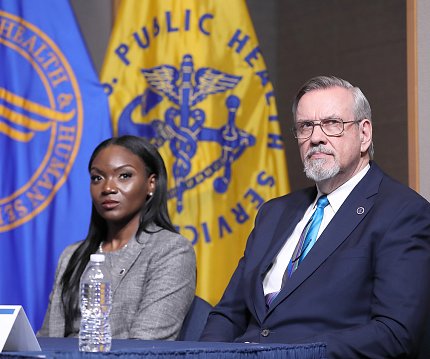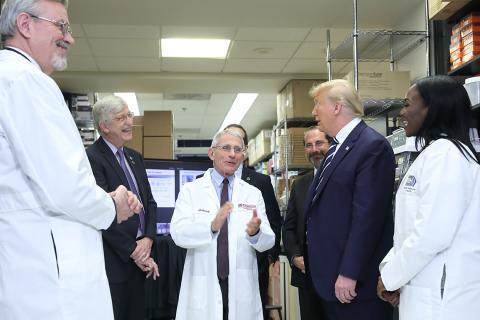First Campus Visit
Trump Gets Update on Coronavirus Research

Photo: Chia-Chi Charlie Chang
In his first visit to NIH on Mar. 3, President Donald Trump learned about NIH’s research response to the coronavirus now sweeping the globe. At a videocast roundtable conducted at the Vaccine Research Center, he learned that NIH is “like the SWAT team of going out and responding to emerging microbes,” explained NIAID director Dr. Anthony Fauci.
“This group is so good at what they do,” said Fauci, referring to the VRC staff that was originally formed to address the HIV/AIDS crisis, “that every time we have a challenge, and that challenge could be flu, that challenge could be Ebola, that challenge could be anything—we always turn to this team to do that.”
Fauci gave the President a primer on the experiences over the last two decades of emerging and re-emerging infectious diseases, including SARS, MERS, Zika and various types of influenza that have threatened global health.

Photo: Chia-Chi Charlie Chang
Once the SARS pathogen was identified in 2003, Fauci explained, it took 20 months before a phase 1 (safety) vaccine trial was begun. Subsequent vaccine programs steadily trimmed this time—but for COVID-19, the phase 1 trial is on track to begin in less than 3 months. In each case, scientific savvy built on past experience helped out with the next viral threat.

Photo: Chia-Chi Charlie Chang
In a variety of forums in early March, Fauci underscored that the phase 1 trial is just the beginning of a series of larger clinical trials and scale-up efforts, all focused on assuring that the vaccine is safe and effective. Even working at record speed, Fauci predicts that wide availability of a vaccine against COVID-19 is 12-18 months away.
“Well I want to thank you all, this is incredible,” said Trump, addressing a panel that included NIH director Dr. Francis Collins, who had opened the event with an overview of NIH’s role and accomplishments in keeping both the nation and the world healthy.
“I’ve heard about you and I know all of you by name,” said the President, “and now I get to meet you—unfortunately I get to meet you—because we’re talking about this,” he quipped.
“NIH is the home…of the greatest doctors,” Trump added. “I heard that from my uncle—Dr. John Trump…I think the world is extremely happy that you’re involved.
“I just want to thank everybody at NIH,” he continued. “I know you are working around the clock.”
Collins explained both the intramural and extramural roles NIH plays in medical research and the function of peer review in selecting projects to support. He said, “You could say we do Alzheimer’s to Zika, or A to Z, or some version of that…and we also support infrastructure that makes it possible in a time like this to be able to move rapidly in terms of developing a vaccine.”

Photo: Chia-Chi Charlie Chang
Also present at the briefing and subsequent tour of the VRC were HHS Secretary Alex M. Azar II, NIH principal deputy director Dr. Lawrence Tabak, VRC director Dr. John Mascola, VRC deputy director Dr. Barney Graham and research fellow Dr. Kizzmekia Corbett of Graham’s staff, “who is on the front line of making this coronavirus vaccine happen,” said Collins.
Toward the end of the 20-minute session, Trump took a handful of questions from members of the media who had accompanied him to NIH—several involving travel and border restrictions imposed by COVID-19.
At one point he paused to say, “You’re so nice today, I can’t believe it. It’s NIH—it rubbed off.”
The full event can be seen at https://videocast.nih.gov/summary.asp?live=36104&bhcp=1.—Rich McManus
